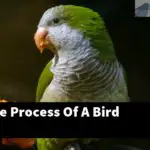There are a few things that you can do in order to train your bird not to bite. One is to make sure that you are providing enough stimulation for them. This can be done by providing them with food and water, as well as toys and games. Another way to train your bird not to bite is to use positive reinforcement. This means that you will reward your bird for not biting you. Finally, you can also try to avoid provoking your bird in any way.
Table of Contents
What are some specific things you can do to train your bird not to bite?
There are a few specific things that you can do to train your bird not to bite.
One is to provide lots of good food and water.
Make sure that the food is high in nutritional value and that the water is clean. This will help to train your bird to not bite because they will want to eat and drink to stay healthy.
Another is to provide your bird with toys that are safe. This can be anything from a simple bird toy that hangs from a tree to a more elaborate play set.
Toys that are safe for birds to play with often have interesting textures and shapes that keep them occupied.
Lastly, make sure to keep your bird well-socialized.
This means exposing them to other birds of the same species and getting them used to people and other animals. This will help to reduce the chance of them biting.
How long does it usually take to train a bird not to bite?
Typically, it takes around 8 weeks for a bird to learn not to bite. The first step is to establish a positive relationship with the bird.
This can be done by providing the bird with food and water, and by teaching the bird to recognize and respond to positive behaviors from you. Once the bird trusts you, you can begin training the bird to not bite by using positive reinforcement.
This means rewarding the bird for not biting, such as giving them a treat or playing with them. Over time, the bird will learn that biting is not rewarded, and they will stop doing it.
Are there any potential risks associated with training your bird not to bite?
There are a few potential risks associated with training your bird not to bite, but the vast majority of these risks are simply theoretical, and there is no evidence that birds who are not trained to bite are any more or less likely to bite people than birds who are trained to bite. The few real risks associated with not training your bird to bite include the following:
• Birds that are not trained to bite may become frustrated and aggressive if they are not allowed to bite people, and may resort to biting in an attempt to get the attention they crave.
• Birds that are not trained to bite may become dangerously inquisitive and aggressive if they are allowed to bite people, and may be more likely to bite people than birds that are trained to bite.
Matiniy 2 Pcs Pirate Parrot on Shoulder Life Sized Artificial Parrot Toy for Costume Dress-up Accessory for Halloween Party(Multicolor)
$14.99 (as of 24/02/2026 22:51 GMT +03:00 - More infoProduct prices and availability are accurate as of the date/time indicated and are subject to change. Any price and availability information displayed on [relevant Amazon Site(s), as applicable] at the time of purchase will apply to the purchase of this product.)Bird Toys, Parrot Toys for Large Birds,Natural Corn cob and Loofah Slices Bird chew Toys for African Grey Parrots, Macaws, Cockatoos, Amazon Parrot and other Small and Medium-Sized Parrot (Colorful)
$12.97 ($12.97 / count) (as of 25/02/2026 00:17 GMT +03:00 - More infoProduct prices and availability are accurate as of the date/time indicated and are subject to change. Any price and availability information displayed on [relevant Amazon Site(s), as applicable] at the time of purchase will apply to the purchase of this product.)Kaytee Fiesta Parrot Food, Nutritious and Fun Blend, Supports Skin, Feather, Digestion, Brain and Heart Health, 4.5 pounds
16% Off• Birds that are not trained to bite may become fearful of humans, and may be less likely to approach people or to interact with people in other ways.
What are some common reasons why birds start biting in the first place?
Biting behavior in birds can be broadly categorized into four primary reasons: territorial aggression, courtship aggression, feeding aggression, and predatory aggression. Territorial aggression is the most common reason for bird biting, accounting for about two-thirds of all biting incidents.
Territorial disputes between birds typically involve displays of aggression, including bites and pecks, followed by retreats and avoidance behaviors on the part of the combatants. The goal of territorial aggression is to establish and maintain a dominance hierarchy within the bird community.
Courtship aggression is exhibited by birds in order to attract mates. Birds may bite other birds in order to intimidate them or to gain access to their mates.
Feeding aggression is exhibited when birds attempt to attack or capture their prey. Predatory aggression is exhibited when a bird seeks to kill another animal for food.
What are some effective methods for preventing bites from happening?
There are a few things that can be done to help prevent bites from happening. One way is to keep yourself and others safe by not allowing dogs to roam freely and by not allowing them to get too close to people.
Another way is to use a deterrent. deterrents can be things like citronella candles, moth balls, or a noise maker.
These can help to scare away dogs and keep them from biting.
Finally, it is important to keep an eye out for warning signs that a dog may be about to bite.
These can include growling, barking, or showing any other signs of aggression. if you see any of these signs, it is important to take action and protect yourself.
How can you tell if your bird is feeling agitated or angry, and is likely to bite?
There are a few key indicators that may suggest your bird is feeling agitated or angry. These can include:
• Your bird is being territorial or aggressive towards other birds or people nearby
• Your bird is constantly flapping its wings or tail feathers, or is constantly making high-pitched noises
• Your bird is biting or scratching you or other people
If any of these signs are present, it is important to take your bird to a veterinarian as soon as possible.
If your bird is already attacking or biting you, it is important to get it to a vet as soon as possible to prevent any serious injury.
What should you do if your bird does happen to bite you or someone else?
If your bird bites you or someone else, the best course of action is to immediately rinse the wound with cold water and seek medical attention. If the wound is bleeding heavily, you may need to apply pressure to the wound with a clean cloth to stop the bleeding.
If you are able to identify the type of bird that bit you, you can try to capture the bird and take it to a wildlife rehabilitator or vet to be released back into the wild.
Are there any other tips or advice you can give on this topic?
There are a few other things that can be done to help improve the quality of a resume. One is to make sure that the resume is easy to read.
Try to use clean, well-organized formatting and keep fonts small and easy to read. Also, make sure that all of the text is properly spelled and that it is properly formatted.
Finally, try to make use of strong, professional graphics that will help showcase your skills and accomplishments.
Summary
Some things you can do to help train your bird not to bite are to provide them with food and water, as well as toys and games. Another way to train your bird not to bite is to use positive reinforcement.
This means that you will reward your bird for not biting you. Finally, you can try to avoid provoking your bird in any way.
























